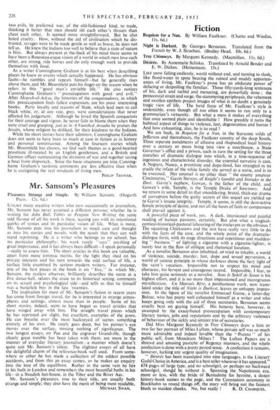Fiction
Night is Darkest. By Georges Bernanos. Translated from the French by W. J. Strachan. (Bodley Head. 10s. 6d.) Troy Chimneys. By Margaret Kennedy. (Macmillan. I Is. 6d.) Desiree. By Annernane Selinko. Translated by Arnold Bender and E. W. Dickes. (Heinemann. 15s.) LIKE snow falling endlessly, world without end, and turning to slush, like flood-water in spate bearing the ruined and muddy appurten- ances of living, Mr. Faulkner's prose has an obdurate power of defacing or despoiling the familiar. Those fifty-yards-long sentences of his, dark and turbid and menacing, are powerfully done ; the pentecostal strain and surge, the stammering periphrasis, the vehement and swollen epithets project images of what is no doubt a genuinely tragic view of life. The lurid force of Mr. Faulkner's style is undeniable, even though all too often it seems to run only to a grammarian's virtuosity. But what a mess it makes of everything that once seemed plain and identifiable ! How greedily it turns the habitual aspect of things to violence, lust, degeneration and horror And how exhausting, alas, he is to read !
We are back, in Requiem for a Nun, in the fearsome wilds of Jefferson and thereabouts, the Faulkner country of the deep South. Three separate instalments of allusive and rhapsodical local history over a century or more bring into view a courthouse, a State Governor's office and a prison, eaCh in turn the setting for the three stretches of dramatic dialogue into which, in a time-sequence of ingenious and characteristic disorder, the essential narrative is cast. A Negress, Nancy, a prostitute and dope-fiend, has strangled in its cradle the infant of the white family she served as a nurse, and is to be executed. Her counsel is no other than "the county amateur Cincinnatus," Gavin Stevens, of Knight's Gambit and Intruder in tbe Dust. Gavin's nephew, Gowan, is the father of the child, and Gowan 's wife, Temple, is the Temple Drake of Sanctuary. And we return in some detail to that smouldering, brutal, thick-ear drama of corruption before the guilty secrets of this sequel are yielded up to Gavin's insane integrity. Temple, it seems, is stilt the destructive female principle of desire, and not all the hosts of faith or compassion shall prevail against it.
A powerful piece of work, yes. A dark, intoxicated and painful reading of human passions, certainly. But also what a tragical- comical-historical-pastoral labouring of the irrelevant or the obvious ! The squatting Chickasaws and the rest have really very little to do with the facts of the case, and the whole point of the dramatic- dialogue form, with its stage directions and repetitious and madden- ing " business" of lighting a cigarette with a cigarette-lighter, is surely lost in the flow of oblique and rhetorical locution.
As a novelist Bernanos also inhabited, or tried to inhabit, a world of violence, suicide, murder, lust, dope and sexual perversion, a world of satanic principle in whose darkness shone the fiery light of the saint's vocation. Impossible not to respect his mind and character, his fervent and courageous record. Impossible, I fear, to take him quite seriously as a novelist. Sous le Sold! de Satan is his highest effort, and it is no more than impassioned and incongruous mystification. Un Mauvais Reve, a posthumous work, now trans- lated under the title of Night is Darkest, leaves an unhappy impres- sion. In the figure of the novelist Emmanuel Ganse, a latter-day Balzac, who has pretty well exhausted himself as a writer and who keeps going only with the aid of three secretaries, Bernanos seems cruelly bent on guying himself. His honesty here, however, is swamped by the exacerbated preoccupation with contemporary literary names, jobs and reputations and by the arbitrary violences of behaviour of the sickly and sinister trio of secretaries.
Did Miss Margaret Kennedy in Troy Chimneys draw a hint or two for her portrait of Miles Lufton, whose private self was so much more admirable and indeed lovable than the "Pronto " of his public self, from Monckton Milnes ? The Lufton Papers are a shrewd and amusing pastiche of Regency manners, and the whole confection is done with a pretty period sense. A confection it remains, however, lacking any urgent quality of imagination.
" Desiree has been translated into nine languages, is the Literary Guild Choice in America, and is a best seller wherever it has appeared." 674 pages of large type, and no schoolgirl, or perhaps no backward schoolgirl, should be without it. Spanning the Napoleonic era, more or less, with the bride of Bernadotte for heroine, a dozen history-book names to the page, and the Coronation ceremony in Stockholm to round things off, the story will bring not the faintest blush to maiden cheeks. No, but really ! R. D. CHARQUES.


































 Previous page
Previous page